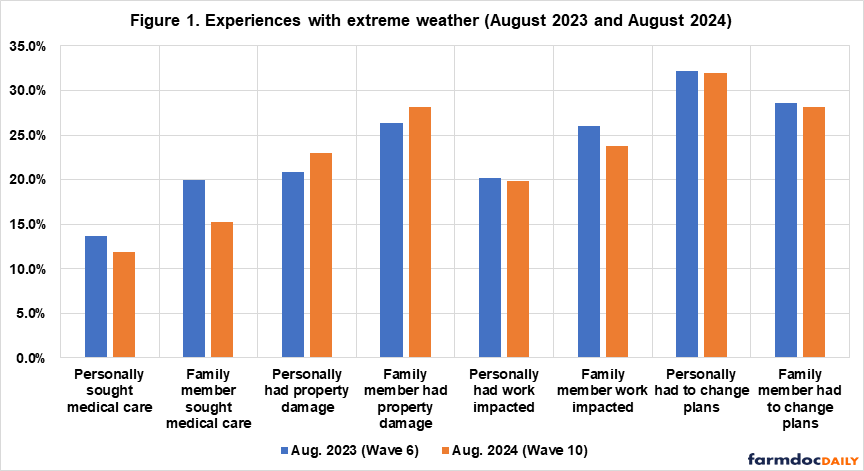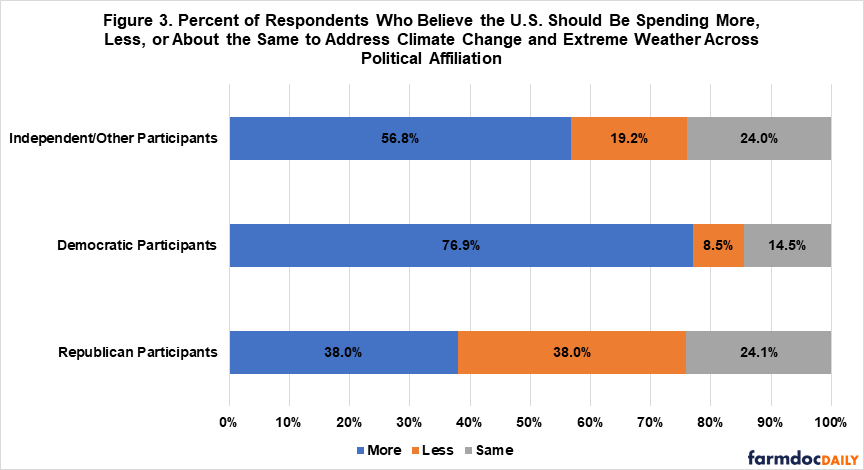Hot, Hot, Hot: Preferences for U.S. Spending to Address Extreme Weather
Introduction
Autumn arrived in the Northern Hemisphere just before 9 a.m. EDT on Sunday, September 22nd as the center of the sun crossed the equator marking the autumnal equinox (Boeckmann, September 23, 2024). Prior to the official passage into fall, scientists concluded that summer 2024 was the hottest summer on record, beating last year’s record heat (Iqbal, September 13, 2024; NOAA, September 12, 2024; NASA.gov, September 11, 2024; Copernicus, September 6, 2024; Paddison, September 5, 2024). In this post, we use data from the most recent wave (August 2024) of the Gardner Food and Agricultural Policy Survey to examine consumers’ views on extreme weather.
Methods
The Gardner Food and Agricultural Policy Survey is a quarterly survey of approximately 1,000 U.S. consumers. Participants are recruited to match the U.S. population in terms of gender, age, income, and geographic region. The purpose of the survey is to track consumer sentiment on important food and agricultural policy issues as well as respond to emerging topics in food and agriculture. For this post, we focus on questions about consumers’ views on extreme weather and compare the responses with those from Wave 6, August 2023 (farmdoc daily, September 20, 2023).
Results
Impacts of Extreme Weather
In both August 2023 (Wave 6) and August 2024 (Wave 10), we asked participants about their experiences with extreme weather (e.g., excessive heat, flooding, hurricanes, wildfires). Both summers exposed the public to extreme weather. Arguably the most notable difference in the U.S. was the degree to which smoke from Canadian and U.S. wildfires impacted regions of the country (Byrne et al., 2024; Andreoni, August 28, 2024; Moses, August 3, 2024; Chow, July 26, 2024; World Weather Attribution, August 22, 2023; farmdoc daily, September 23, 2023).
This summer, we find that 65.3% of participants said they personally experienced extreme weather and 64.5% said an immediate family member experienced extreme weather. This is quite similar to measures from a year ago when 68.8% said they had experienced extreme weather and 67.3% said an immediate family member had experienced extreme weather.
Figure 1 shows the proportion of respondents who said they personally or a family member sought medical care, incurred property damage, reduced work time, or changed plans (e.g., vacation) due to extreme weather. This figure shows responses from both 2023 (blue) and 2024 orange). Responses were quite similar between the two summers, however we do see a reduction in the proportion of respondents who said a family member had to seek medical treatment (15.2% this summer vs. 20.0% last summer).
Consumer Perceptions of Spending on Climate Change and Extreme Weather
Using the GFAPS, we also asked participants for their opinions on whether the U.S. should be spending more, less, or about the same to address climate change and extreme weather. This we have tracked every quarter between August 2023 (Waves 6) and August 2024 (Wave 10). Figure 2 illustrates the responses, where blue shows the proportion who believe spending should increase, orange shows the proportion who believe it should be decreased, and gray shows the proportion who believe the current spending allocation is correct. Across waves, we continue to find that the majority of respondents believe the U.S. should be spending more to address climate change and extreme weather.
Finally, as it is an election year, we also evaluate views on spending across participants’ stated partisan affiliation. Figure 3 illustrates the responses using results from August 2024 (Wave 10), where blue depicts the proportion who supported increasing spending, orange depicts the proportion who support decreasing spending, and gray depicts the proportion who believe the current allocation is best. We find that a large majority of Democratic participants support additional spending (76.9%). The majority of those who do not align with one of the major parties also supported increased spending (56.8%). Republicans were more split, with about 38% supporting additional spending, 38% supporting reduced spending, and 24.1% happy with current spending.
Closing Thoughts
Summer 2024 was the hottest on record and brought several extreme weather events across the country. Using results from the Gardner Food and Agricultural Policy Survey, we discuss the public’s experiences, comparing results from this summer with last. We also evaluate public preferences for U.S. spending to address climate change and extreme weather, highlighting differences across political parties. First, we find that respondents were similarly affected by extreme weather events this summer as they were last summer, with slightly less reporting a need for medical care this summer. Second, across five waves of data, we continue to see strong support for increasing U.S. spending efforts to address climate change and extreme weather. Finally, we find that preferences for spending were highly polarized.
References
Andreoni, Manuela. “Canada’s Wildfires Were a Top Global Emitter Last Year, Study Says.” The New York Times. August 28, 2024. https://www.nytimes.com/2024/08/28/climate/canada-wildfires-emissions-carbon.html.
Boeckmann, Catherine. “Facts, Folklore, and Everything You Need to Know About the Fall Equinox.” Almanac.com. September 23, 2024. https://www.almanac.com/content/first-day-fall-autumnal-equinox.
Byrne, B., Liu, J., Bowman, K.W. et al. Carbon emissions from the 2023 Canadian wildfires. Nature 633, 835–839 (2024). https://doi.org/10.1038/s41586-024-07878-z.
Chow, Denise. “Smoke from wildfires in Canada and the West Coast spreads across North America.” NBCNews.com. July 26, 2024. https://www.nbcnews.com/science/environment/smoke-wildfires-canada-oregon-california-spreads-rcna163810.
Copernicus. “Summer 2024 – Hottest on record globally and for Europe.” August Climate Bulletins. September 6, 2024. https://climate.copernicus.eu/copernicus-summer-2024-hottest-record-globally-and-europe.
Iqbal, Saima S. “Summer 2024 Was the Hottest Ever Measured, Beating Last Year.” Scientific American. September 13, 2024. https://www.scientificamerican.com/article/summer-2024-was-the-hottest-ever-measured-beating-last-year/.
Kalaitzandonakes, M., J. Coppess and B. Ellison. "Extreme Weather and the Food System." farmdoc daily (13):171, Department of Agricultural and Consumer Economics, University of Illinois at Urbana-Champaign, September 20, 2023.
Moses, Claire. “Fires Have Burned 4.5 Million Acres This Year, Blanketing Much of North America in Smoke.” The New York Times. August 3, 2024. https://www.nytimes.com/2024/08/03/weather/wildfire-smoke-california-northwest.html.
NASA. “NASA Finds Summer 2024 Hottest to Date.” September 11, 2024. https://www.nasa.gov/earth/nasa-finds-summer-2024-hottest-to-date/.
Paddison, Laura. “The planet endures its hottest summer on record—for the second straight year.” CNN.com. September 5, 2024. https://www.cnn.com/2024/09/05/climate/hottest-summer-record-copernicus/index.html.
U.S. Dept. of Commerce. National Oceanic and Atmospheric Administration. “Earth had its hottest August in 175-year record: Summer 2024 was Northern Hemisphere’s warmest on record.” September 12, 2024. https://www.noaa.gov/news/earth-had-its-hottest-august-in-175-year-record.
World Weather Attribution. “Climate change more than doubled the likelihood of extreme fire weather conditions in Eastern Canada.” August 22, 2023. https://www.worldweatherattribution.org/climate-change-more-than-doubled-the-likelihood-of-extreme-fire-weather-conditions-in-eastern-canada/.
Disclaimer: We request all readers, electronic media and others follow our citation guidelines when re-posting articles from farmdoc daily. Guidelines are available here. The farmdoc daily website falls under University of Illinois copyright and intellectual property rights. For a detailed statement, please see the University of Illinois Copyright Information and Policies here.










